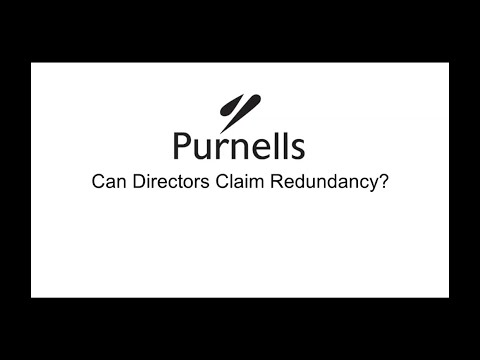Can Directors Claim Redundancy in an Insolvent Liquidation?
How and when directors can claim Redundancy?
It is well established in case law that there is nothing preventing a director being both a director and an employee of a company. If the director is also an employee then the director will be able to make a redundancy claim if the Company was placed into a formal insolvency process. The key issue is documentation.
Contract of employment
If a director has a formal contract of employment or even if there are board minutes confirming their employment and setting out the terms of the employment, then more often than not that is sufficient evidence to demonstrate that a director is also an employee.
However merely having a contract of employment will not be enough, the director must also be paid through the payroll.
If a director has a contract of employment, and is paid through the payroll, then there is no reason why they cannot claim redundancy through the Redundancy Payments Office, and also notice pay, arrears of wages and holiday pay.
If the business has been running for a long time, say five years or more, the amount the director can claim can be quite substantial.
How much can be claimed?
The problem is whether the directors have tried to be tax efficient, by being remunerated with a small monthly salary through the payroll, typically in the region of £700 to £800, to keep up to date with national insurance contributions, and the balance being taken through drawings and dividends.
Directors would only really be able to claim the sum paid through the payroll. However, £750 a month is a very low salary, and the director’s claim is likely to be minimal.
This is where the National Minimum Wage Regulations come into effect.
If a director is working 40 hours a week, and assuming there are four weeks in a month, this will mean that the director’s hourly rate is £4.68, which is below the national minimum wage.
The Redundancy Payments Office have indicated that provided the director can evidence the hours that they have worked, the fact that they are an employee, and can provide payslips, a contract of employment etc, then they will automatically increase the hourly rate to the national minimum wage, which will nearly double the amount of the claim.
More often than not the directors wish to do the right thing by placing the company into liquidation, which will ensure that the insolvent company is dealt with properly, professionally and quickly, but will also protect their staff, and enable them to claim the sums owed to them. However, if the directors have injected all of their personal funds into the Company, and there are no assets in the Company, how are they to pay for a liquidation?
If the director can legitimately make a claim from the Redundancy Payments Office, and if that claim is worth several thousand pounds, which is usual, then this claim can often be used to meet the costs of placing the Company into liquidation.
Making your claim
Once a company is in a formal insolvency procedure, the directors can make their claim to The Redundancy Payments Service. Alternatively there are also agents and claim management companies that can assist directors in making their claims. While this can make the process quicker and easier for directors, it is not essential.
It is possible for the directors to use their employee claims to fund a Creditors Voluntary Liquidation and can be a useful way to place a company into liquidation at effectively no cost to the directors.
If you would like a free meeting with a licensed insolvency practitioner to discuss your company’s situation, or whether or not as a director you could make an employee claim, please call 01326 340 579 or email chris@purnells.co.uk for a no obligation meeting.
Would you like us to give you a call?
Fill in the form and we'll give you a call as soon as we can to discuss your needs in a free initial consultation with a Licensed Insolvency Practitioner. Alternatively give us a call on 01326 340579 if there is an urgency to your needs.
The information provided will be used solely to contact you and any information you provide will be held in accordance with our firm's privacy policy, and not used for marketing purposes.






